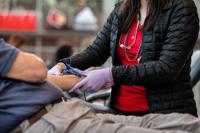A phlebotomist tends to the arm of a blood donor at the KFC YUM! Center during the Starts, Stripes, and Pints blood drive event on July 7, 2021 in Louisville, Kentucky. (Jon Cherry/Getty Images)
Versión en español
If you come from a Latine household, you may be used to a parent trying every remedy under the sun before taking a trip to the doctor. Obstacles like limited insurance access, high costs, language barriers and immigration status often stop members of this community from seeking lifesaving care. Now, the Red Cross is flipping the script and asking Latine communities to become the lifesavers.
In September, the American Red Cross launched its second annual Los Donantes campaign, celebrating Hispanic Heritage Month and encouraging Hispanic and Latinx communities to donate blood.
According to the Red Cross, 57% of Latine people have Type O blood, the most commonly transfused blood type. O-negative is known as the universal type, used for any patient regardless of their blood type and O-positive is the most frequently occurring blood type.
While Latines have the largest share of Type O blood, less than 1% actually donate. Among them is Miguel de Zubeldia, 42.
The Guadalajara-raised Tucson local has been donating his O-negative blood consistently since 2020, recently reaching his 30th donation in September. He said he began after feeling helpless during a series of family health complications and at the height of the COVID-19 pandemic.
“If you feel compelled or would like to help people who could be in a pretty tough health situation, donating blood is actually a pretty easy thing to do,” he said.
After donating for five years, the simple ten-minute process is something that he now looks forward to and “wishes he had started sooner.” He says it’s an “easy lift,” especially knowing it will help people in potentially dire situations.
According to the Red Cross, one blood donation can save up to three lives. Mike Sagara, volunteer PIO for their Southern Arizona Chapter, told CALÓ News there is always a need for blood, and campaigns like Los Donantes are designed to diversify their supply and ensure all underrepresented groups are accounted for.
“We want to make sure that we have blood on the shelf that’s going to take care of the whole population,” Sagara said.
He also addressed potential concerns. For many minority communities, healthcare and blood donation are shrouded in misinformation and distrust. It is something Dr. Pedro Rodriguez, chairman of the Arizona Latin-American Medical Association (ALMA) and a long-time physician in the West Valley is actively trying to combat.
Founded in 1993, ALMA is a nonprofit organization that focuses on creating sustainable cultural initiatives in healthcare, sponsoring medical students from all backgrounds and establishing a reliable network of healthcare for Arizona. Rodriguez said he wants his organization to stand as an example of trustworthy physicians working to serve the communities they belong to.
“The doctor used to rip you off. There’d be doctors that would pick your last buck, I get it,” he said. “But now we have one of the safest systems in the world. We just need to overcome that fear. All this is free, all this is our own time — nobody pays [ALMA] for this. We’re here to serve the community.”
ALMA holds health fairs to connect underinsured and uninsured people with providers they can trust, meeting them where they are. Rodriguez echoed the Red Cross’s message, hoping to ease hesitancy and encourage the community to donate blood.
“Many of our patients are hesitant to donate blood because they think they’ll be harmed or lose something, which is absolutely not true,” Rodriguez said. “We need to demystify that fear and remind people this is a life-saving gift.”
Both Rodriguez and Sagara made note that, not only is it free, but questions surrounding things like immigration status or sexual orientation are avoided and irrelevant to the cause.
For them, campaigns like Los Donantes aren’t just about increasing donations — they’re about rebuilding trust between Latino communities and the healthcare system. He hopes that through awareness and representation, more people will view blood donation as an act of empowerment rather than one of fear.
“We’ve been here forever,” Rodriguez said. “We’ve been here before, it was the United States, and we’ll continue to be here. People stand together, aim for better health and learn to make choices based on knowledge, not fear.”
Just as de Zubeldia started in 2020 when the world was flipped upside down, he said the need for blood is ever-present and is a simple, effective way to help others.
“This is about saving lives,” Rodriguez said, “It’s something that the human race shares.”
For more information about blood donation services visit https://www.redcrossblood.org/give.
Lorenzo Gomez is a multimedia journalist and master’s student at Arizona State University’s Walter Cronkite School of Journalism and Mass Communication. His reporting focuses on Indigenous communities, immigration, politics and culture. His work has been featured in CALÓ News, Navajo Times, Arizona Daily Sun, Cronkite News and News21.



